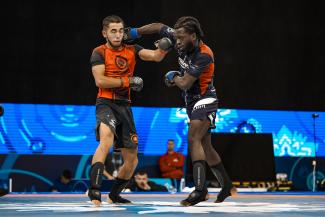Greco-Roman entry list for #WrestleBudapest Ranking Series
Friday, June 23, 2023 - 05:34 By Eric Olanowski & Vinay Siwach

BUDAPEST, Hungary (June 23) -- On the last two days of the fourth Ranking Series event in Budapest, Hungary, 210 Greco-Roman wrestlers will take the mat and try to win the medal and the ranking points for the World Championships.
The final Ranking Series event -- Polyák Imre & Varga János Memorial -- begins July 13 in the Hungarian capital however Greco-Roman will be in action on July 15 and 16 with multiple entries from Kazakhstan, Turkiye, Azerbaijan, Georgian, Hungary, South Korea and the USA.
The competition will see a number of World Championships medalists go up against each other. Some of the potential face-offs include Eldaniz AZIZLI (AZE) facing Nugzari TSURTSUMIA (GEO) at 55kg, Edmond NAZARYAN (BUL) against Kerem KAMAL (TUR) at 60kg, Leri ABULADZE (GEO) vs Victor CIOBANU (MDA) at 63kg and Hasrat JAFAROV (AZE) and Mohamed ELSAYED (EGY) at 67kg.
In the heavier weight classes, Danial SOHRABI (IRI) will be at 72kg, up from 67kg, Zoltan LEVAI (HUN) could face Sanan SULEYMANOV (AZE) at 77kg while Rafig HUSEYNOV (AZE) has moved up to 87kg, a weight class which already has Islam ABBASOV (AZE), Gurami KHETSURIANI (GEO), Istvan TAKACS (HUN) and David LOSONCZI (HUN).
At 97kg, Alex SZOKE (HUN) may outplace other wrestlers in this open weight class but the competition will also mark the return of European silver medalist Arvi SAVOLAINEN (FIN). At 130kg, Riza KAYAALP (TUR) will be the favorite.
Live action from the fourth Ranking Series will be on uww.org and UWW App from July 13.
Greco-Roman
55kg
Eldaniz AZIZLI (AZE)
Ramaz SILAGAVA (GEO)
Nugzari TSURTSUMIA (GEO)
Mahdi AHADI ZENAB (IRI)
Amangali BEKBOLATOV (KAZ)
Yersin ABYIR (KAZ)
Denis MIHAI (ROU)
Brady KOONTZ (USA)
60kg
Nihat MAMMADLI (AZE)
Edmond NAZARYAN (BUL)
Liguo CAO (CHN)
Nikolai MOHAMMADI (DEN)
Jeremy PERALTA GONZALEZ (ECU)
Haithem MAHMOUD (EGY)
Pridon ABULADZE (GEO)
Erik TORBA (HUN)
Krisztian KECSKEMETI (HUN)
Jozsef ANDRASI (HUN)
Omid ARAMI (IRI)
Yernur FIDAKHMETOV (KAZ)
Nursultan BAZARBAYEV (KAZ)
Aibek SABYRBEKOV (KAZ)
Seunghak KIM (KOR)
Hanjae CHUNG (KOR)
Joao BENAVIDES ROCHABRUN (PER)
Razvan ARNAUT (ROU)
Virgil BICA (SWE)
Kerem KAMAL (TUR)
Ildar HAFIZOV (USA)
Dalton ROBERTS (USA)
63kg
Aker SCHMID (AUT)
Murad MAMMADOV (AZE)
Tino OJALA (FIN)
Leri ABULADZE (GEO)
David MANYIK (HUN)
Levente TOTH (HUN)
Iman MOHAMMADI (IRI)
Dastan ZARLYKHANOV (KAZ)
Mukhamedali MAMURBEK (KAZ)
Yerzhet ZHARLYKASSYN (KAZ)
Jinwoong JUNG (KOR)
Justas PETRAVICIUS (LTU)
Victor CIOBANU (MDA)
Xavier JOHNSON (USA)
67kg
Hasrat JAFAROV (AZE)
Nestor ALMANZA TRUYOL (CHI)
HUSIYUETU (CHN)
Andres MONTANO ARROYO (ECU)
Mohamed ELSAYED (EGY)
Joni KHETSURIANI (GEO)
Diego CHKHIKVADZE (GEO)
Krisztian Istvan VANCZA (HUN)
Adam POHILEC (HUN)
Sultan ASSETULY (KAZ)
Din KOSHKAR (KAZ)
Merey BEKENOV (KAZ)
Seongcheol YANG (KOR)
Hansu RYU (KOR)
Minseong KWON (KOR)
Kristupas SLEIVA (LTU)
Adomas GRIGALIUNAS (LTU)
Valentin PETIC (MDA)
Morten THORESEN (NOR)
Haavard JOERGENSEN (NOR)
Nilton SOTO GARCIA (PER)
Mihai MIHUT (ROU)
Mate NEMES (SRB)
Niklas OEHLEN (SWE)
Murat FIRAT (TUR)
Mustafa YILDIRIM (TUR)
Alejandro SANCHO (USA)
Robert PEREZ (USA)
72kg
Ulvu GANIZADE (AZE)
Toni OJALA (FIN)
Elmer MATTILA (FIN)
Ramaz ZOIDZE (GEO)
Otar ABULADZE (GEO)
Robert FRITSCH (HUN)
Krisztofer KLANYI (HUN)
Levente LEVAI (HUN)
Shahin BADAGHI MOFRAD (IRI)
Danial SOHRABI (IRI)
Zaur KABALOEV (ITA)
Daniyar KALENOV (KAZ)
Erik PERSSON (SWE)
Selcuk CAN (TUR)
Patrick SMITH (USA)
77kg
Sanan SULEYMANOV (AZE)
Aik MNATSAKANIAN (BUL)
Halishan BAHEJIANG (CHN)
Rui LIU (CHN)
Oldrich VARGA (CZE)
Mohamed KHALIL (EGY)
Jonni SARKKINEN (FIN)
Akseli YLI HANNUKSELA (FIN)
Mikko PELTOKANGAS (FIN)
Iuri LOMADZE (GEO)
Sachino DAVITAIA (GEO)
Zoltan LEVAI (HUN)
Attila TOESMAGI (HUN)
Mohammad NAGHOUSI (IRI)
Maxat YEREZHEPOV (KAZ)
Kaharman KISSYMETOV (KAZ)
Azat SADYKOV (KAZ)
Daekun PARK (KOR)
Alexandrin GUTU (MDA)
Exauce MUKUBU (NOR)
Juan AAK (NOR)
Yuksel SARICICEK (TUR)
Kamal BEY (USA)
Ravaughn PERKINS (USA)
82kg
Francisco KADIMA (ANG)
Michael WAGNER (AUT)
Gela BOLKVADZE (GEO)
Erik SZILVASSY (HUN)
Peter DOEMOEK (HUN)
Alireza MOHMADIPIANI (IRI)
Shamil BATYROV (KAZ)
Dias KALEN (KAZ)
Mihail BRADU (MDA)
Kristoffer BERG (SWE)
Mats AHLGREN (SWE)
Spencer WOODS (USA)
87kg
Bachir SID AZARA (ALG)
Lukas STAUDACHER (AUT)
Islam ABBASOV (AZE)
Rafig HUSEYNOV (AZE)
Sosruko KODZOKOV (BRA)
Semen NOVIKOV (BUL)
Ioannis NARLIDIS (CAN)
Haitao QIAN (CHN)
Fei PENG (CHN)
Matej MANDIC (CRO)
Mohamed METWALLY (EGY)
Andreas VAELIS (EST)
Gurami KHETSURIANI (GEO)
Istvan TAKACS (HUN)
David LOSONCZI (HUN)
Sunil KUMAR (IND)
Nursultan TURSYNOV (KAZ)
Azamat KUSTUBAYEV (KAZ)
Yevgeniy POLIVADOV (KAZ)
Sanghyeok PARK (KOR)
Byeongcheol SHIN (KOR)
Martynas NEMSEVICIUS (LTU)
Marcel STERKENBURG (NED)
Alex KESSIDIS (SWE)
Zachary BRAUNAGEL (USA)
97kg
Markus RAGGINGER (AUT)
Daniel GASTL (AUT)
Murat LOKIAYEV (AZE)
Arif NIFTULLAYEV (AZE)
Igor ALVES DE QUEIROZ (BRA)
Yiming LI (CHN)
Vinko PRODANOVIC (CRO)
Kristian LUKAC (CRO)
Artur OMAROV (CZE)
Mathias BAK (DEN)
Mohamed GABR (EGY)
Arvi SAVOLAINEN (FIN)
Lasha TVILDIANI (GEO)
Tamas LEVAI (HUN)
Alex SZOKE (HUN)
Vahid DADKHAH GHASEM ABADI (IRI)
Nikoloz KAKHELASHVILI (ITA)
Olzhas SYRLYBAY (KAZ)
Seungjun KIM (KOR)
Seyeol LEE (KOR)
Mindaugas VENCKAITIS (LTU)
Tyrone STERKENBURG (NED)
Felix BALDAUF (NOR)
Aleksandar STJEPANETIC (SWE)
Josef RAU (USA)
130kg
Beka KANDELAKI (AZE)
Sabah SHARIATI (AZE)
Yasmani ACOSTA FERNANDEZ (CHI)
Lingzhe MENG (CHN)
Marcel ALBINI (CZE)
Abdellatif MOHAMED (EGY)
Heiki NABI (EST)
Matti KUOSMANEN (FIN)
Konsta MAEENPAEAE (FIN)
Iakobi KAJAIA (GEO)
Dariusz Attila VITEK (HUN)
Laszlo DARABOS (HUN)
Amir GHASEMIMONJEZI (IRI)
Aliakbar YOUSOFI (IRI)
Anton SAVENKO (KAZ)
Seungchan LEE (KOR)
Minseok KIM (KOR)
Romas FRIDRIKAS (LTU)
Oskar MARVIK (NOR)
Alin ALEXUC CIURARIU (ROU)
Riza KAYAALP (TUR)
Cohlton SCHULTZ (USA)
Adam COON (USA)


Share your thoughts.
Comments